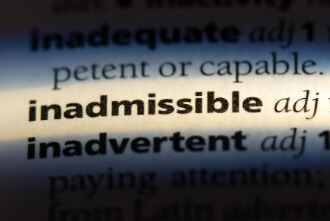
On August 14, 2019, the Department of Homeland Security (DHS) announced its new rule that changed how U.S. Citizenship & Immigration Services will determine inadmissibility on the grounds of public charge. “Public charge” is a ground of inadmissibility. Grounds of inadmissibility are reasons that a person could be denied a green card, visa, or admission into the United States. It is not a test that applies to everyone.
The new rule was scheduled to take effect on October 15, 2019; however, multiple federal courts issued injunctions that temporarily stopped the rule from taking effect as scheduled. On January 27, 2020, the U.S. Supreme Court lifted the nationwide injunction which was preventing the rule from going into effect. The new rules will go into effect on February 24, 2020 (except for individuals residing in the State of Illinois).
These rules will also affect individuals applying for nonimmigrant and immigrant (green card) visas at the U.S. Embassies and Consulates as the Department of State will be issuing its own guidance and set of new forms to be completed by applicants who are consular processing.
In deciding whether to grant an applicant a green card or a visa, an immigration officer must decide whether that person is likely to become dependent on certain government benefits in the future, which would make them a “public charge.” The new rule will govern how USCIS will consider totality of the circumstances and make a forward-looking determination as to whether an applicant will likely become a public charge. It essentially shifts the focus away from the U.S. petitioner to the foreign national applicant.
There are different analysis that will take place depending whether an applicant is applying for adjustment of status (green card) or a change or extension of a nonimmigrant status. Consult with your attorney to determine what criteria will be used in your unique situation.
Its important to note that this new rule is not retroactive and will only apply to applicants that file after February 24th. There are classes of foreign national applicants that are exempt from or eligible for a waiver of the public charge determinations.
Under the new rule, public charge is now expressly tied to the receipt of public benefits. An applicant is “likely to become a public charge” if it is more likely that the person will receive public benefits at any time in the future.
Here is a chart of what is and is not included in the definition:
| Benefits Included for Public Charge | Benefits Excluded from Public Charge |
| Cash Support for Income Maintenance* Non-Emergency Medicaid** Supplemental Nutrition Assistance Program (SNAP or Food Stamps) Housing Assistance (Public Housing or Section 8 Housing Vouchers and Rental Assistance) * Included under current policy as well; ** Exception for coverage of children under 21, pregnant women (including 60 days post-partum) | ANY benefits not on the included list will not be applied toward the public charge test. Examples include: Disaster relief Emergency medical assistance Entirely state, local or tribal programs (other than cash assistance) Benefits received by immigrant’s family members CHIP Special Supplemental Nutrition for Women Infants and Children (WIC) School Breakfast and Lunch Energy Assistance (LIHEAP) Transportation vouchers or non cash transportation services Non-cash TANF benefits Tax credits, including the Earned Income Tax Credit and Child Tax Credit Advance premium tax credits under the Affordable Care Act Pell grants and student Loans Any other program not listed in the left column |
The new analysis of public charge will weigh the positive and negative facets of the following factors:
- Age
- Health
- Family Status
- Assets and financial status
- Education and Skills
- Prospective immigration status and expected period of admission
- Affidavit of Support
Heavily weighted negative factors that are identified in the rule are:
- Applicant is authorized to work but is unable to demonstrate current employment, recent employment history or a reasonable prospect of future employment;
- The applicant has received or has been certified or approved to receive one or more public benefits for more than 2 month in aggregate within a 36 month period;
- Applicant has been diagnosed with a medical condition that is likely to require extensive medical treatment or institutionalization or that will interfere with the alien’s ability to provide for him/herself, attend school or work … the applicant is uninsured has does not have the prospect of getting private insurance nor the financial resources to pay for medical costs; or
- Applicant has previously been found inadmissible or deportable on public charge grounds by an Immigration Judge or Board of Immigration Appeals.
Heavily weighted positive factor in the rule are:
- The applicant has a household income, assets, resources, and support of at least 250% of the federal poverty guidelines;
- The applicant is work authorized and currently employed at or above 250% of federal poverty guidelines for the household size; or
- The applicant has appropriate health insurance for expected period of admission which excludes subsidies in form of premium tax credits under the Patient Protection and Affordable Care Act.
If an applicant is determined to be inadmissible on the public charge grounds, the Department of Homeland Security, in its discretion, will allow the applicant to post a bond. The amount of the bond will be determined by the Department of Homeland security at a minimum of $8,100, adjusted annually for inflation.
Contact us for additional information related to this topic and for advice regarding how to navigate U.S. immigration laws.
TESTIMONIALS
"We would highly recommend Layli Eskandari Deal's services to anyone that is in need of a dedicated immigration lawyer." -Avvo Review
"Ken is a lifesaver and ... was completely different and had no qualms about my case, and assured me that it would work out. I was not disappointed" - Avvo Review
"She went above and beyond her call of duty and standardly recognized level of interest in my case and her legal responsibilities as my attorney." - Avvo Review
"Ken was very helpful and diligent with the work. Got me an L1B, then a H1B visa renewed 2 or 3 times, and finally a green card. Great work!" - Avvo Review
WE CAN HELP
We'd love to speak with you about your situation. Every case is different and needs personalized attention from experienced immigration laywers. Your new team is waiting to hear from you.
